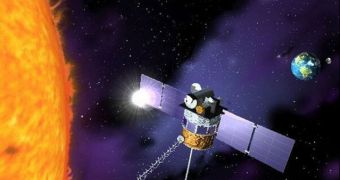Members of the US House Appropriations Committee have adopted the bill that cancels the James Webb Space Telescope (JWST) NASA is developing, two satellite missions of the National Oceanic and Atmospheric Administration (NOAA), and severely hampers progress on many other missions.
The vote on a 2012 spending bill took place yesterday, July 13, and saw the panel providing NASA with pre-2008 funding levels. The level of funds the agency will receive is nearly $2 billion below what US President Barack Obama proposed.
This means that the agency will not have receive enough money to complete the JWST, which was billed as Hubble's successor. At the same time, the agency was awarded nearly $2 billion for completing the Space Launch System (SLS), America's next heavy-lift rocket.
The wording the committee used in the bill to explain why it proposed canceling the JWST is well fit to be used by 4-year-olds who had their toys taken away. It clearly shows that the current make-up of the panel lacks the vision and dedication necessary to conduct such an important committee.
“Although JWST is a particularly serious example, significant cost overruns are commonplace at NASA, and the Committee believes that the underlying causes will never be fully addressed if the Congress does not establish clear consequences for failing to meet budget and schedule expectations,” the document says.
“The Committee recommendation provides no funding for JWST in fiscal year 2012. The Committee believes that this step will ultimately benefit NASA by setting a cost discipline example for other projects and by relieving the enormous pressure that JWST was placing on NASA’s ability to pursue other science missions,” it goes on to say.
In other words, the $3 billion that were already poured into the most complex and advanced telescope in the world will go down the drain so that NASA can save money on smaller projects, which will never reach this level of funding. That makes perfect sense.
In one fell swoop, the Committee managed not only to put a massive dent in the country's space capabilities over the next decade, but also to damage all other agencies whose fundings it controls.
The $47.3 million Deep Space Climate Observatory (DSCOVR) and the $11.3 million Constellation Observing System for Meteorology Ionosphere and Climate-2 (COSMIC-2) satellites were also canceled. The spacecraft would have allowed NOAA to boost its capabilities beyond any other agency's.
This new set of decision highlights beyond a doubt that a handful of individuals, appointed by political interests in an important Committee, can destroy a country's leadership in space in a single blow. Fortunately, these individuals do not have the final say in this matter.
The document must pass through the full House, and then be reconciled with the budget plans that pass through the Senate. In other words, there is still a chance that at least the JWST will be saved.

 14 DAY TRIAL //
14 DAY TRIAL //